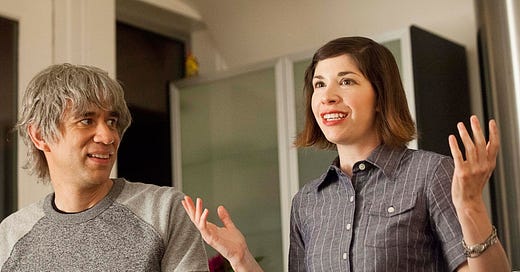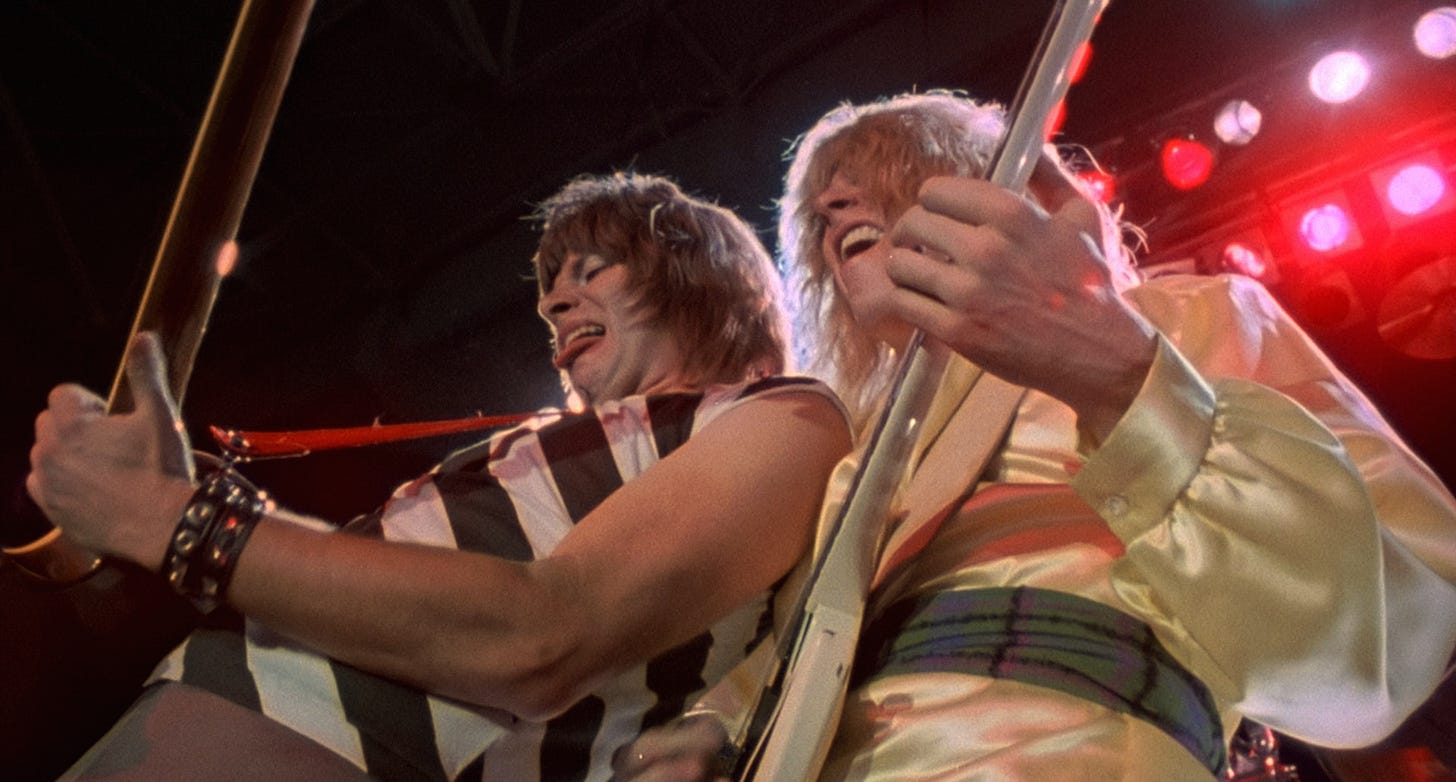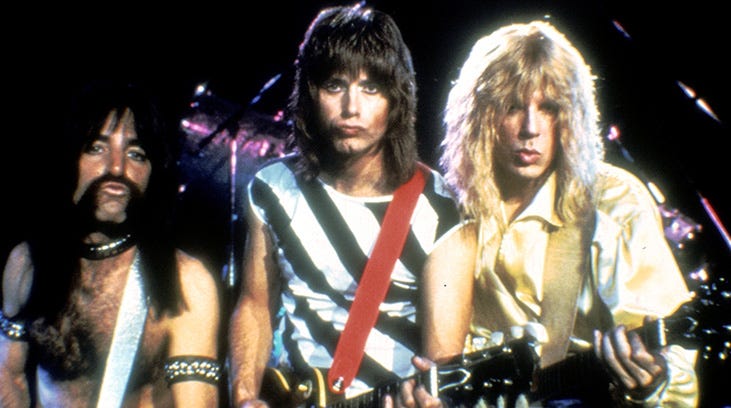Rescued from The Dissolve: Fred Armisen and Carrie Brownstein on the indispensability of THIS IS SPINAL TAP
Originally published on The Dissolve as part of the "Compulsory Viewing" feature (4/23/2014)
Beyond their bond as the co-creators and stars of the IFC series Portlandia, Fred Armisen and Carrie Brownstein share something else in common: They both started their careers in music, Brownstein as part of Sleater-Kinney, Armisen most notably as drummer for the post-hardcore band Trenchmouth. Although Armisen left his music career behind in favor of pursuing a career in acting, which he achieved through his lengthy stint as a cast member on Saturday Night Live, he recently returned to his roots, taking on the additional responsibility of serving as bandleader for NBC’s Late Night With Seth Meyers.
That musical bond between Armisen and Brownstein may also have something to do with why, when asked to pick a movie that they both consider compulsory viewing, it didn’t take long to come up with a consensus: 1984’s This is Spinal Tap, directed by Rob Reiner. The rock documentary—or “rockumentary,” if you will—takes audiences through the life and times of the fictional heavy-metal band Spinal Tap, with director/interviewer Marty DiBergi (Reiner) filming the members of the band—David St. Hubbins (Michael McKean), Nigel Tufnel (Christopher Guest), and Derek Smalls (Harry Shearer)—while they’re dealing with the ins and outs of the music industry. Although Armisen and Brownstein both realize how many people have already seen the film, they readily discussed the reasons why it’s such a must-see.
The Dissolve: How would you describe the film to someone who’s about to watch it for the first time?
Fred Armisen: Well, before I go into it, I worry about saying something like, “You should see this.” I don’t want to make it seem like I’m any authority—or that we’re any authority—on what movies you should or shouldn’t see. I just want to preface it by saying that. But with that said, it is a perfect movie. [Laughs.] Aside from me being able to describe what it is, it’s just that it’s stood the test of time, comedy-wise and structure-wise and story-wise, so that’s the most important reason why it’s such a great movie. It’s not like, “Oh, this represents my generation,” or anything like that. It’s just so perfectly done, and everything is believable and funny at the same time.
Carrie Brownstein: I guess the most factual thing I could say about it is that it’s a fake documentary—or “mockumentary”—and it’s one of the first of its kind, although I guess Albert Brooks was also doing stuff like that. But it essentially created this template for a lot of contemporary humor, as far as mockumentaries and talking to the camera, and it’s so… real. There’s sort of an underlying truth and a… schadenfreude, I guess? [Laughs.] I don’t know if that’s the right word, but I feel like that’s what a lot of other things, like The Office, are about too, where, as an audience member, you feel a small sense of joy watching these other people fall apart, and at the same time you have vicarious embarrassment. I think that’s the crux of a lot of contemporary humor, and I feel like it all started with this film.
The Dissolve: How did you first discover the film?
Armisen: I saw it in a movie theater when I was in college. It might’ve been my first year in college. It was playing in this little theater in New York City. I can’t even remember what brought me there. You know how you always forget why you went to whatever movie? This is an example of that. I have no idea why or how I heard of it, but there I was.
Brownstein: I probably saw it on video in high school, when it first came out on VHS, or at some point when it came out on VHS, anyway. I rented it and watched it with friends, and I just thought it was hilarious. Also, it has that verisimilitude where the songs operate as real songs and also as comical.
The Dissolve: The film also takes the time to expand on the history of the band by creating archival footage and music to go with the various stages of the band’s creative evolution.
Armisen: Oh, it’s genius. It’s incredible.
Brownstein: Yeah, so you really can watch it as something that is authentic, because the experiences are so relatable, and I think then when I started playing music… I think what’s so interesting about the film is that there are moments that it defined for people, and then they would experience them later when they played in bands, so you’d be having a moment that felt absurd or embarrassing or a comedy of errors, and you would think in your head, “Oh, well, This Is Spinal Tap.” You can’t find the stage, you can’t harmonize right, everything you’re doing is a flop, or, you know, the stage prop you have is embarrassingly small or inept. [Laughs.] There are so many moments that, when I went on to play music, I felt drawn back to that movie. So I think that’s why it’s had such longevity. Sure, it’s fake, but it’s very real.
The Dissolve: Fred, had you gotten involved in music yet when you first saw the film?
Armisen: Yeah, I had already played in a punk band and stuff.
The Dissolve: Did you see any of your own experiences in it as you were watching it?
Armisen: I think that’s why the movie works: because every musician sees themselves. It’s not only the failure stuff. It’s the weird little moments, like when they’re on the bus, or when they’re talking to people from the record company. Just weird little teeny things that everyone identifies with. I remember around maybe 1992, 10 years after the movie came out, there was this interview with George Harrison, and they were, like, “Why don’t you tour more? You’ve got this band together. Is there any reason why you’re not touring?” And one of the reasons he gave was, “I don’t want to turn into some kind of Spinal Tap thing.” And I thought, “Wow! The Beatles now use that as a reference!” For a Beatle to use that as a point of reference, I just thought that was really incredible, that that’s how far it went: It became a reason that a Beatle won’t tour.
The Dissolve: Would you care to estimate how often you’ve seen the film?
Armisen: Oh, that’s hard. Because it’s played so many times on cable or in people’s houses. I couldn’t even guess.
Brownstein: Yeah, I mean, dozens and dozens of times. It’s the kind of movie where, if you stumble upon it, you keep watching. Which I can’t say about every movie.
The Dissolve: Do you still occasionally find new jokes that you haven’t noticed before?
Armisen: Somewhere way after I first saw it, I noticed the one about the Isle of Lucy festival. It took me a while. Actually, I feel like somebody pointed it out to me!
The Dissolve: As you were saying, it helped define the mockumentary, but it also served to lay waste to a lot of clichés of the rockumentary, too.
Armisen: Yeah, and it also has a great ending. And great performances! There’s a lot to be said for how great their British accents are. That’s another level. There’s really great acting in it, including the woman who plays Michael McKean’s girlfriend [June Chadwick] and their manager, Ian [Tony Hendra]. All of the acting is really, really good. So there’s that, too.
The Dissolve: Is there any subplot in the film that you find particularly enjoyable?
Brownstein: I do love all the stuff with the record covers, and with Fran Drescher. I find that stuff really trenchant and very funny.
Armisen: I like the optimism that they’re huge in Japan. [Laughs.] Do you remember when they’re at the hotel, and this other manager comes in with another musician, and they’re about to go play the Enormo-Dome or whatever they call it. But this other guitar player or rock star or whatever, the look in his eyes, he looks like a grade-A dummy, completely vapid. His eyes are so empty that it’s just perfect casting of a guy who became a star way too quick. You know, he’s just smiling and waiting in the lobby. It’s just perfect.
The Dissolve: The manager in that scene is played by Howard Hesseman, and you mentioned Fran Drescher. It’s amazing how many people pop up in the film in small roles. Patrick Macnee’s another one.
Armisen: Dana Carvey, too. And Billy Crystal!
The Dissolve: When you’ve played in Cleveland, have you felt obliged to quote the film and yell, “Hello, Cleveland”?
Brownstein: Well, I mean, that is how pervasive the movie is: You can’t fly or drive into Cleveland with a guitar and get onstage without thinking of that line. Cleveland is practically defined by that line for musicians.
The Dissolve: Have you ever had a tantrum over the size of the bread and ham backstage?
Brownstein: [Laughs.] No. I’ve definitely gotten lost on the way to the stage, though!
The Dissolve: Any real-life Spinal Tap moments for you, Fred?
Armisen: Yeah, remember when Artie Fufkin was at that record store? Just the way that he was taking the blame, I remember back when I was in a band, there were people who would just take the blame for any record snafu that happened. Actually, the second Trenchmouth record came back pink when it was supposed to be white, and we played it off eventually, like, “Oh, yeah, it’s cool, it’s supposed to be pink!” But I remember Damon [Locks] going, “Look! It’s pink!”
The Dissolve: For the record, when you two picked This Is Spinal Tap for this feature, I suspected it would eventually just devolve into everyone just saying, “Do you remember that time in the movie when this happened?”
Armisen: [Laughs.] You can’t talk about it without that happening!
Brownstein: Yeah, it’s just part of everyone’s vocabulary at this point.
The Dissolve: So how would you say the long-form improvisational character thing in the film has informed your work in Portlandia?
Brownstein: I think there’s definitely an awareness of that kind of thing. I mean, we don’t do the two-camera kind of improvisation that obviously was in Spinal Tap, and then when Christopher Guest is directing his films, obviously that methodology is utilized. But the film is just so much part of the lexicon of filmmaking and documentary and improvisation. There are so many moments where you find yourself thinking, “Oh, that’s been done before,” and often you can link that back to Spinal Tap. So it’s not necessarily that we’re improvising and we’re, like, “Oh, this is like Spinal Tap,” in terms of, like, the method. But it has so many jokes in it that I think it just can’t really be done again.
The Dissolve: Have either of you met any of the members of the band? And if so, did you successfully avoid geeking out?
Armisen: I met Michael McKean, and I geeked out on purpose. [Laughs.]
Brownstein: You know, I guess I haven’t met any of the main members.
Armisen: But we did have a member of Spinal Tap on Portlandia.
Brownstein: Oh, yeah, Ed [Begley, Jr.]! Wasn’t he one of the drummers?
Armisen: He was the original drummer!
Brownstein: In that case, I have met a member! [Laughs.]
The Dissolve: Fred, when you did “The Clash: The Last Gang in Town,” did you intend that as an overt homage to Spinal Tap?
Armisen: Well, everything is, in a way, you know? Really! Everything kind of is. Or it’s inspired by it, or it’s influenced by it without you even knowing it. I think you don’t even realize it sometimes. When I talked to Michael McKean, and I’m not namedropping, but—no, wait, yes I am. [Laughs.] But one thing I told him was that, when we were writing Portlandia, I once had this idea of doing something with a whole bunch of bass players together, but it was like, “Oh, well, I guess Spinal Tap already did that with their all-bass band.” And I was like, “I can’t believe that in 2012 we still have to measure ourselves against Spinal Tap.” But we still do. There are still things that you can’t do because they did it.
The Dissolve: I talked to Steve Dawson, the bassist for Saxon who provided a great deal of inspiration for Derek Smalls, and he said that when he and some of his bandmates went to see This is Spinal Tap in the theater with some of the members of Iron Maiden, the guys from Iron Maiden got up and walked out in disgust. Have either of you ever met any musicians who just didn’t find the film funny?
Armisen: No!
Brownstein: [Laughs.] I’ve never met a musician—or anyone else!—who doesn’t find the film funny!
Armisen: It’s like, who doesn’t love that movie? I don’t know anyone who doesn’t love that movie. That’s a unanimous movie. Everyone loves it.
The Dissolve: So what makes This Is Spinal Tap compulsory viewing?
Brownstein: I would just say its influence. The amount of influence that that movie has, that’s what makes it compulsory viewing. If you listen to music, if you’ve ever seen a concert, if you’ve ever been a fan of any musical artist… [Laughs.] I mean, it’s so broadly influential in terms of comedy and music. You have to see it.
Armisen: I would simply say that if you’ve seen the movie—and we’ve all seen the movie, haven’t we?—then I envy us. [Laughs.]







